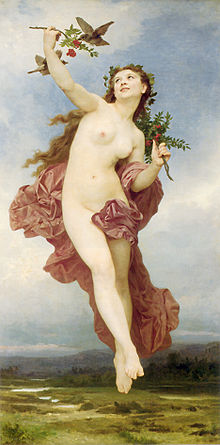Dies (mythology)
| Dies | |
|---|---|
Personification of day | |
 Hemera/Dies (1881) by William-Adolphe Bouguereau | |
| Genealogy | |
| Parents | Chaos and Caligo |
| Siblings | Nox, Erebus, and Aether |
| Consort | Aether, Caelus |
| Children | Terra, Caelus, Mare |
| Equivalents | |
| Greek | Hemera |
In Roman mythology, Dies /ˈdaɪ.iːz/[1] (Latin diēs "day") was the personification of day. She was the daughter of Chaos and Caligo (Mist), and the counterpart of the Greek goddess Hemera.
Family
According to the Roman mythographer Hyginus, Chaos and Caligo were the parents of Nox (Night), Dies, Erebus (Darkness), and Aether.[2] Cicero says that Aether and Dies were the parents of Caelus (Sky).[3] While, Hyginus says that, in addition to Caelus, Aether and Dies were also the parents of Terra (Earth), and Mare (Sea).[4] Cicero also says that Dies and Caelus were the parents of Mercury, the Roman counterpart of Hermes.[5]
Name
The Latin noun diēs is based on the Proto-Italic accusative singular *dijēm, itself stemming from the Proto-Indo-European root *dyeu-, denoting the "diurnal sky" or the "brightness of the day" (in contrast to the darkness of the night).[6][7] The corresponding Proto-Indo-European day god is *Dyeus.
See also
Notes
- ^ "dies". Oxford English Dictionary (Online ed.). Oxford University Press. (Subscription or participating institution membership required.)
- ^ Hyginus, Fabulae Theogony 1 (Smith and Trzaskoma, p. 95).
- ^ Cicero, De Natura Deorum 3.44.
- ^ Hyginus, Fabulae Theogony 1–2 (Smith and Trzaskoma, p. 95).
- ^ Cicero, De Natura Deorum 3.56.
- ^ de Vaan 2008, p. 170.
- ^ West 2007, p. 167.
References
- Cicero, Marcus Tullius, De Natura Deorum in Cicero: On the Nature of the Gods. Academics, translated by H. Rackham, Loeb Classical Library No. 268, Cambridge, Massachusetts, Harvard University Press, first published 1933, revised 1951. ISBN 978-0-674-99296-2. Online version at Harvard University Press. Internet Archive.
- Hyginus, Gaius Julius, Fabulae in Apollodorus' Library and Hyginus' Fabulae: Two Handbooks of Greek Mythology, Translated, with Introductions by R. Scott Smith and Stephen M. Trzaskoma, Hackett Publishing Company, 2007. ISBN 978-0-87220-821-6.
- de Vaan, Michiel (2008). Etymological Dictionary of Latin and the other Italic Languages. Brill. ISBN 9789004167971.
- West, Martin L. (2007). Indo-European Poetry and Myth. Oxford University Press. ISBN 978-0-19-928075-9.
External links
 The dictionary definition of Dies at Wiktionary
The dictionary definition of Dies at Wiktionary

